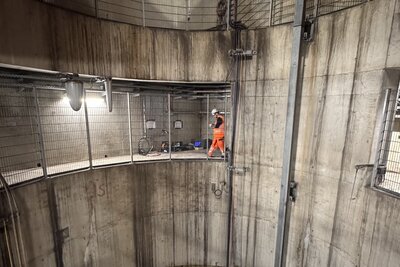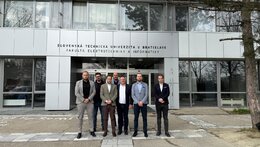This study program is offered not only at FEI STU but also at the University of Economics in Bratislava. The home university for this program is the Slovak University of Technology (STU). The admission requirements are determined by STU, and applications are also submitted through our university.
Admission requirements will be added soon.
Basic information
| Name: | management in nuclear |
| Degree of education: | 2nd level, ISCED-F code 767 |
| Field of study: | electrical and electronics engineering, economics and management, ISCED-F kód 0713; 0413 |
| Type of study programme: | engineer study programme, joint study programme |
| Awarded academic degree: | engineer (Ing.) |
| Form of study: | only full-time |
| Language of study: | English |
| Standard length of study: | 2 years |
| Cooperating universities: | University of Economics in Bratislava |
| Supervisor: | doc. Ing. Andrea Šagátová, PhD. |
| Co-supervisor: | doc. RNDr. Zuzana Hajduová, MSc, PhD. |
What will you learn?
A graduate of the Management in Nuclear program has expertise in energy production, transmission, and conversion with a focus on nuclear facilities, as well as knowledge of the physical principles of radiation, its effects, and the regulatory frameworks of the industry. They are skilled in financial management, planning and controlling, managerial strategies, and EU legislation. They can use software tools, apply radiation protection principles, and manage projects and teamwork. The graduate is capable of designing technological and financial solutions, analyzing trends, and making responsible decisions with regard to safety, reliability, and societal impacts. They also possess communication and leadership skills in a foreign language.
Courses
1st year
Winter semester (1st semester)
mandatory course
Knowledge of the principles of radiation protection for radiation workers and the public. Understanding of the phys ical, chemical, and biological processes of radiation effects on living matter and the physical processes of radiation detection and measurement.
Skills in measuring dosimetric quantities, planning radiation protection, and meeting conditions for activities lead ing to exposure.
mandatory course
Acquisition of new knowledge in the process of developing financial plans for enterprises in the nuclear energy sector. This involves reviewing theoretical knowledge and insights gained from previous courses at the bachelor's and master's levels, with an emphasis on financial areas specific to nuclear enterprises. This knowledge will be applied and validated in the preparation of financial analyses, SWOT analyses, investment project evaluations, and the development of financial plans for selected firms in the nuclear sector. Students will gain knowledge and apply practical skills in financial decision-making regarding the financing of both long-term and short-term assets, as well as planning within nuclear projects. They will learn to understand the relationships and connections between various components of the financial plan and other sub-plans of the enterprise, with a focus on the specifics of the nuclear industry. The process will include the creation of plans for profits, costs, investments, depreciation, and amortization, as well as financial statements, cash flows, and plans for the distribution of achieved results. This process will be based on established goals, which will be grounded in retrospective and predictive financial analyses, SWOT analyses, and other tools that allow for the assessment of the real financial situation of enterprises in the nuclear energy sector.
mandatory course
Students will understand the concepts, processes and methods of personnel management. Upon completion of the course, students will be able to use, evaluate and develop people management systems and become a senior management partner for leading and managing people.
Students will be knowledgeably prepared to apply in human resource management departments in businesses, organizations, and staffing agencies, and will be prepared to provide consulting and advisory services.
mandatory course
Students will understand the concepts, processes and methods of personnel management. Upon completion of the course, students will be able to use, evaluate and develop people management systems and become a senior management partner for leading and managing people.
Students will be knowledgeably prepared to apply in human resource management departments in businesses, organizations, and staffing agencies, and will be prepared to provide consulting and advisory services.
mandatory course
Students will understand the concepts, processes and methods of personnel management. Upon completion of the course, students will be able to use, evaluate and develop people management systems and become a senior management partner for leading and managing people.
Students will be knowledgeably prepared to apply in human resource management departments in businesses, organizations, and staffing agencies, and will be prepared to provide consulting and advisory services.
mandatory course
Student:
- understands thermodynamic description of matter
- understands the formulation of the continuum description of matter using partial differential equations
- is able to solve 1D problems of heat conduction using heat equation
- understands the mathematical formulation of the Finite Elements Method
- knows how to perform simulations of heat transfer using programs GMSH and ELMER
- can critically analyze results of numerical simulations
- can use similarity relationships for the calculation of heat transfer coefficients in engineering problems of heat transfer
Summer semester (2nd semester)
mandatory course
Acquisition of new knowledge in the process of developing financial plans for enterprises in the nuclear energy sector. This involves reviewing theoretical knowledge and insights gained from previous courses at the bachelor's and master's levels, with an emphasis on financial areas specific to nuclear enterprises. This knowledge will be applied and validated in the preparation of financial analyses, SWOT analyses, investment project evaluations, and the development of financial plans for selected firms in the nuclear sector. Students will gain knowledge and apply practical skills in financial decision-making regarding the financing of both long-term and short-term assets, as well as planning within nuclear projects. They will learn to understand the relationships and connections between various components of the financial plan and other sub-plans of the enterprise, with a focus on the specifics of the nuclear industry. The process will include the creation of plans for profits, costs, investments, depreciation, and amortization, as well as financial statements, cash flows, and plans for the distribution of achieved results. This process will be based on established goals, which will be grounded in retrospective and predictive financial analyses, SWOT analyses, and other tools that allow for the assessment of the real financial situation of enterprises in the nuclear energy sector.
mandatory course
Intermediate understanding of market mechanisms of pricing, including supply, demand, costs, and regulatory policies in the energy sector. Knowledge of price elasticity and its impact on energy companies’ pricing strategies. Understanding the impact of regulatory frameworks, emission quotas, and subsidies on energy market prices.
mandatory course
A comprehensive understanding of the energy company and its economic activities, through defining the project’s nature, life cycle, objectives, and typology, with a focus on business strategy analysis and an entrepreneurial mindset, including initiative, proactivity, innovation, motivation, and commitment to business goals.
mandatory course
Knowledge of the principles of nuclear reactor construction and understanding of the physical processes in the reactor core in both steady and transient states. Acquired skills in calculating the core’s basic neutron-physical parameters.
It is necessary to choose at least 1 course.
- Supply chain management
A comprehensive look at the nature and creation of the supply chain, its management, active and passive elements, their role and importance in the supply chain, outsourcing in supply chain management, reasons, advantages versus disadvantages, material management, and warehousing in the supply chain, transport in the supply chain, information flows and technologies in the supply chain, green and reverse logistics, integrated supply chain.
- Leadership and communication
Comprehensive view of leadership, its transformations in the past and present, as well as future challenges. Gaining a detailed overview of individual leadership concepts and approaches, creating a knowledge base on selected key leadership approaches, understanding the importance of emotional and cultural intelligence, defining leadership in crises and extreme conditions, and understanding the impact of culture on leading people.
Comprehensive knowledge in the area of communication in corporate practice, defining the application possibilities of using communication forms and models in leadership, their advantages and disadvantages, as well as gaining complex knowledge in relation to both the internal and external environment of the company, including communication tools, procedures, and methods, their optimal selection, and evaluating the effect and impact.
It is necessary to choose at least 1 course.
- Detection of Ionizing Radiation
Obtaining the overview of various ways of detection of ionizing radiation. Obtaining the knowledge in recent detection systems of ionizing radiation and their principle of operation. Obtaining practical experience in measuring various types of ionizing radiation. Obtaining basic knowledge in problematic of detector read-out via analogue and digital spectrometric chain.
- Medical Applciations of Nuclear Techniques
This course aims to familiarize the student with the physical principles of nuclear techniques applied in various medical diagnostics and treatment procedures.
2nd year
Winter semester (3rd semester)
mandatory course
The goal of the subject is focused on methods and approaches for solving of relatively large projects as well as for synthesis of knowledge achieved in different subjects using different information sources. To show the ability for independent and creative solving of difficult tasks in accordance to actual methods used in selected area. To show a preparedness for applications in praxis.
mandatory course
Knowledge of utilizing experimental reactors, experimental methods and neutron measurement techniques for power reactor operation. Acquired skills in the determination of neutron-physical characteristics and selected experimental methods.
mandatory course
Knowledge about operation regimes of NPPs. Knowledge about safety and reliability of NPPs. Ability to recognize risks connected to NPP operation.
mandatory course
After passing the course, the student has a basic command of technical and technological control of power system focusing on the calculation and selection of the most suitable solutions during steady and transient states in control of power system operation. Students can create a mathematical model to calculate steady state and determination of distribution of power flows and power losses in the power system. Student has a basic command of primary, secondary and tertiary frequency control and voltage control in the power system, as well as the basics of dispatch control in the power system.
mandatory course
- Graduates understand theories and concepts of sustainable growth, especially in the context of the energy sector, and recognize the primary factors influencing environmental, social, and economic sustainability of enterprises.
- They are familiar with current regulatory requirements and EU policy initiatives and understand their impact on energy business strategies.
- Graduates are knowledgeable in advanced economic analysis and capital budgeting methods, understanding how these tools are used to assess investment projects in the energy sector.
- They possess deep knowledge of the significance and process of research and development (R&D) in energy, including measuring R&D investment returns through indicators and linking them with sustainable innovations.
- Graduates understand external growth processes through mergers and acquisitions, including synergy evaluation, due diligence, and post-acquisition integration within energy enterprises.
- They are well-versed in the importance of ESG (Environmental, Social, Governance) criteria for evaluating enterprise sustainability and know how to apply these in decision-making processes and strategic planning in energy.
- Graduates are aware of the fundamentals of ethical business and corporate social responsibility (CSR), understanding their influence on long-term growth and the reputation of energy enterprises.
It is necessary to choose at least 1 course.
- Pricing
Intermediate understanding of market mechanisms of pricing, including supply, demand, costs, and regulatory policies in the energy sector. Knowledge of price elasticity and its impact on energy companies’ pricing strategies. Understanding the impact of regulatory frameworks, emission quotas, and subsidies on energy market prices.
- Financial Engineering
Comprehensive elaboration of identification, analysis, guidance and monitoring of financial risks of the enterprise, with emphasis on price risks, credit risks and liquidity/liquidity risks. Based on the quantification of financial risk, propose a strategy aimed at maximising profit, eliminating the selected financial risk or managing the value of the financial investment, with financial and commodity derivatives as supporting instruments.
Summer semester (4th semester)
mandatory course
The goal of the subject is focused on methods and approaches for solving of relatively large projects as well as for synthesis of knowledge achieved in different subjects using different information sources. To show the ability for independent and creative solving of difficult tasks in accordance to actual methods used in selected area. To show a preparedness for applications in praxis.
mandatory course
Knowledge of the properties of nuclear materials, their management, methods of their processing, treatment, and fixation for subsequent storage and disposal. The acquired basic knowledge of the properties of spent nuclear fuel, radioactive waste, raw materials important for nuclear energy, the uranium market, the possibilities for closing the fuel cycle, nuclear material security, and related legislative aspects. Skills related to the basic work with simulation tools, data processing, radiation shielding design, uranium fuel reprocessing, reactivity control, material release into the environment, and basic methods of material diagnostics and radiation measurement.
mandatory course
The aim of the subject is to master the methods and procedures of solving relatively large-scale projects, as well as the methods of synthesis of knowledge obtained in individual subjects of study and the use of information resources. Demonstrate the ability to independently and creatively solve more complex tasks in accordance with current methods and procedures used in the relevant field. Master the written processing of project results, their presentation and defense before the committee.
mandatory course
The aim of the course is to enable the student to gain practical experience.
mandatory course
- Acquire knowledge about the causes of the emergence and the purpose of strategic management, and about strategic management concepts.
- Acquire knowledge of methods for strategic analysis and synthesis.
- Gain knowledge about business and corporate strategies.
- Learn methods for strategy implementation.
- Understand the essence of organizing and organizational design and its place in the company's management system.
- Understand the process of organizing, creating the company’s organizational structure, and its dimensions – centralization, formalization, hierarchy, and specialization.
- Recognize the impact of new trends such as the emergence of shared service centers, outsourcing, or offshoring on the organizational structure, and the concept of co-working.
mandatory course
The aim of the subject is to verify the student’s knowledge acquired in selected compulsory study courses in front of the committee.
It is necessary to choose at least 1 course.
- Experimental Methods
Gaining theoretical knowledge about advanced diagnostic methods based on atomic and nuclear-physical processes. By completing the course, the student will master the theoretical foundations and gain experimental skills in using sophisticated methods of materials analysis that provide information at the atomic and/or nuclear level.
- Modelling ans Simulation in Nuclear Power Engineering
Basic knowledge in the field of reactor and nuclear power plant multi-physics modelling and simulation.






